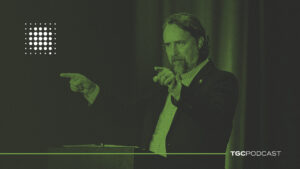Listen or read the following transcript as John Frame speaks on the topic of Christian Worldview in this address from The Gospel Coalition Sermon Library
The following unedited transcript is provided by Beluga AI.
This is History of Philosophy in Christian Thought, Part One, Ancient and Medieval.
Okay, the introduction, why study philosophy? Perhaps some of you have wondered about that. I think there are at least four reasons. One is to learn how to think with more clarity and cogency and profundity. Andy perhaps remembers that triad I used to tell students that the way to get A’s from me on their papers is to focus on clarity, cogency, and profundity.
But if you ask, you know, who is it that gives the most attention to formulating their position using cogent arguments and trying to get into the depth of the issues, you can’t find a better example than philosophy. There are certainly other disciplines that you could study in order to learn to think, but usually in a university curriculum, logic is found in the philosophy department. And methods of learning how to think, methods of argumentation, methods of criticizing the argumentation of others, that tends to be done in the philosophy department, because of course it’s been philosophers who have tried really hard to take their worldview, you know what a worldview is, it’s a way of looking at everything, to take their worldview and describe it clearly and to give cogent arguments why other people should have the same worldview.
And so to expose yourself to people like that is to learn yourself how to think more clearly. You need to, if you agree with them, well, you know, you’re agreeing with some pretty substantial argumentation. If you don’t agree with them, then you have to come up with argumentation that’s at least comparable to theirs, in order to show that they’re wrong. So this gets us into an area of thinking, it really challenges the mind.
The second reason is to understand better the intellectual background of Christian thought. Now this is a seminary, and so most of your time here is going to be spent studying the Bible and studying Christian traditions and studying Christian scholars and writers. But of course our Christian theology has been very deeply influenced by philosophy. Now it’s been influenced by other things too, it’s been influenced by history and the arts and the sciences.
But in the formulation of Christianity as a worldview, that’s going to be one of my major themes. You have these other worldviews, but you also have a biblical worldview, which competes with these other worldviews. The Christian faith is not just a religion, it’s not just something that you do on Sunday. The Christian faith is a way of looking at everything, it’s a worldview. And the Christian worldview, the biblical worldview exists in competition with the secular worldviews that predominate in the history of philosophy.
But nevertheless, the philosophical worldviews have influenced the formulations of Christian theologians, especially in the Greek period, philosophers like Plato and Aristotle had a huge influence on the medieval theologians. You can’t understand Augustine without understanding Plato. You can’t understand Thomas Aquinas without understanding Aristotle. So there has been a huge interplay, an interface between the philosophers, even the secular philosophers, and the Christian thinkers.
So as I say, other disciplines are also useful, but philosophers have been the most influential, I would say, upon Christian thought in the formulation of a Christian worldview.
Then the third reason to study philosophy, to be acquainted with the most formidable adversaries of Christianity. Here’s the apologetic thrust of this course, to become acquainted with the most formidable opponents of Christianity. Now you know, people oppose Christianity from the standpoint of the arts, and from the standpoint of history, and from many other standpoints, and it’s useful, you know, there’s the Christian faith is attacked by sociologists and psychologists, as Andy would tell you, and many other disciplines.
But again, it’s the philosophers who are self-consciously trying to articulate their worldview. And if they’re not Christians, they’re self-consciously trying to articulate a non-Christian worldview. And they’re using these formidable powers of logic that they have, these formidable powers of thought and argument, to try to do the very best job that anybody could do in articulating this worldview, which is an alternative to the Christian one.
Now if you’re going to go out in the world today and fight the spiritual warfare in the intellectual world, and all of you will, I mean, you may have a little country church and you may say, well, you know, I don’t meet any existentialists here, I don’t meet anyPlatonists or Aristotelians, but nevertheless, you’re going to be, you know, the kids are going to go off to college and they’re going to come back and they’re going to have hard questions to ask. People have TVs and they’re going to see things on TV and read things in the news magazines and whatever, and you’ve got to be ready to offer some kind of response from a Christian point of view. You’ll be much better off in formulating that response if you know where some of these secular views come from historically, and if you know what kind of arguments lie behind them.
So that’s going to be a major emphasis of this course, a kind of apologetic, making clear the difference between the Christian worldview and the non-Christian worldview. We’re trying to make clear especially what the weaknesses of the non-Christian worldview are, so that we can respond to them appropriately.
And then D, in this course, we shall also study Christian thought, focusing on Christian thought as a worldview or philosophy. Now, we’re not going to be reading, you know, there’s a great devotional literature that we could read. I think that’s treated in another course in the RTS curriculum, and there are wonderful Christian historians, Christian artists, Christian musicians, and so on. But in this course, I’m not just going to, you know, talk about Christian thought in general, I’m going to focus on those Christian thinkers who have themselves been philosophical to a certain extent. Those who have formulated a Christian worldview and wrestled with the alternatives.
So we’re going to be looking primarily at theologians, and primarily theologians with a philosophical bent, like Augustine, like Thomas Aquinas, like Thomas Reed, like Pascal, people like that, who are able to formulate the Christian philosophy and set that over against non-Christian philosophies of various kinds. Okay, you know, feel free to ask questions at any point here, but I hope I’ve made clear some of the reasons why it’s appropriate to have a course like this within the seminary curriculum.
All right, Roman numeral II, philosophy. What is philosophy? General observations. Ralph, what is philosophy? Philosophy is trying to formulate your worldview, it’s a disciplined attempt to articulate and defend a worldview, a general way of looking at the world. And in doing that, you know, Christianity is the same, isn’t it? And not only philosophers do this, not only Christianity, but other religions too are concerned about taking a worldview and giving a rigorous description of it, and a rigorous argument for it.
And so, there’s a very close parallel between philosophy and religion. I would insist that the philosophical quest, people talk about the quest for wisdom, philosophy means love of wisdom. And people sometimes talk about the Greeks as kind of naive little children who are, you know, looking at the world in wonder, you know, trying to make sense out of it. And there’s a certain amount of that, but basically the Greeks have an axe to grind. They have a religious point of view that they’re out to defend. And the basic questions of philosophy are religious in character.
Now, let me indicate the basic divisions of philosophy, all right? Basic divisions of philosophy are metaphysics, sometimes called ontology, from the Greek word on, ontos, on, that idea, and metaphysics is the study of being, if you want, the reality, the general structure of the universe. Science studies the detailed structure of the universe. Philosophy studies the general structure of the universe, what things there are, what’s the difference between being and non-being, and so on.
And you see here under metaphysics, why is there something rather than nothing? Why are things the way they are? What are the most basic features of reality? Well, as I just go over those questions, you can see the parallels to Christian theology. The question, why is there something rather than nothing, is the question of creation, isn’t it? And Genesis 1 gives us an answer to that. There are alternative answers that are given by the philosophers. Why are things the way they are? Well, the Christian faith answers that by the doctrine of providence, but there are alternative ways of answering that question in the history of philosophy.
Three, what are the most basic features of reality? What is the ultimate structure of things? And that’s certainly something that the Bible talks to us about. I’ll outline the Christian worldview, as I understand it, in a minute. That’s metaphysics.
And then you have epistemology. And of course, this comes from a Greek word, epistemai, meaning knowledge, to know. So epistemology is the study of knowledge. Metaphysics is the study of being, this is what is, this is how you know it. And epistemology discusses such questions as, what is knowledge? How is knowledge possible? How do we go about knowing? How do we distinguish truth from falsity? How do we distinguish reality from appearance?
Now, it may not seem to you obvious that that, too, has religious overtones, but those are religious questions also. The Bible has an awful lot to say about knowing God. It has a lot to say about wisdom. It has a lot to say about the difference between true knowledge and false claims to knowledge. The difference between wisdom and foolishness. The difference between the wisdom of the world and the wisdom of God. So there’s quite a lot in the Bible that’s epistemologically relevant.
The doctrine of revelation, for example. How do we know God? Well, we know God because He’s revealed Himself in creation and in Scripture. So the doctrine of Scripture becomes important in a Christian epistemology. My first book, Doctrine of the Knowledge of God, that was published in 1987, which I’m not asking you to read in this course, but tries to develop an epistemology, not from the usual philosophical standpoints, but from the Bible.
It’s possible to derive an epistemology from the Bible, a doctrine of knowledge. And I think it’s important that Christians become acquainted with that. And then, of course, we have the third division, I say ethics there on the outline, but maybe let’s move back a little bit and call it value theory. And value theory then would include aesthetics, for example. It would include ethics, it would include economics, perhaps, insofar as that’s something that philosophers can discuss. But all different kinds of value, all right?
Metaphysics then studies being, epistemology, knowledge, and then value. Now somebody might ask, I’m new to the discipline of philosophy, where do I start? And you might think that it would be wise to start here. Learn everything you can about being. In fact, you might think I need to learn everything about being, what is, before I start to study this and study that. Well, that’s plausible. But how are you going to do that? I mean, how are you going to study being if you don’t know anything about knowledge? I mean, you’re using your knowledge up here, aren’t you? Right? You need to know something about knowing if you’re going to know something about being.
So somebody says, okay, well, I’ll start here, is what Gordon Clark likes to say, start here, epistemology. But, you know, how can you study knowledge if you’ve never known anything, you know? How can you study knowledge because knowledge is about relating to the world, you know? It’s my mind and the world. And how do I understand this relationship between the mind and the world if I know nothing about the world? So really, you know, you have to know a little bit of this in order to do this, and you need to know a little bit of this in order to do that.
So what this means is that these are mutually dependent, all right? And that’s an important lesson for us, you know, we tend to want to, when we have a face with a list like this, we’re tempted to say, well, what order do we go in, you know, do we do this first, and this second, or this third? Often, I think, and this is true a lot in the biblical teaching, there are mutually interdependent relationships.
And what happens practically is, you know, you start where you are, knowing what you know in the world around you, and then you reflect a little bit on how you’re knowing those things. And then you go back up here again, and then you find you’re able to know a little more, and then that helps you to understand your knowledge a little bit more. And there’s a spiral there, it’s like going around a tree, and every time you go around it, you’re up a little higher, and you’re able to see each of these because of the other.
Now, what about value theory, where does that fit in? There are people who would say that you don’t need value theory at all in order to do these, because value theory is subjective, and these are objective. Everybody has their own values, your values are just what you feel about things, right? And those are just relative and subjective, and so who knows?
But look, if you’re going to do this, epistemology, in knowledge we’re faced by all this data around us. And how are we going to bring it together, so that we can say that we have knowledge about it? Now there are responsible ways of doing that, and there are irresponsible ways of doing that. And that responsibility is an ethical question. There are responsible ways of dealing with data, you know, you don’t want to bend them in order to fit your preconceived opinions, right? You want to be honest with the data, you want to be diligent in following out your questions till you reach the conclusion. That’s an ethical value too, diligence, honesty.
And from a biblical point of view, you need to listen to what God’s word says, even about knowledge, okay? God’s word tells you that His revelation provides the final standard of truth. Now you can either do that or not do it, but that’s an order, that’s God’s command. And so that’s an ethical principle, 1 Corinthians 10:31 says, whether you eat or drink or whatsoever you do, do all to the glory of God. Is knowledge part of that? Eating? Drinking? Does knowledge come under the whatever?
31 So, whether you eat or drink, or whatever you do, do all to the glory of God. (1 Corinthians 10:31, ESV)
Yeah, I think so. I mean, it’s talking about all areas of life. So, knowledge must be done in obedience to God’s Word, and that means it’s to be done according to God’s values, according to God’s standards. And, of course, you know, this is a discovery that secular epistemologists have made somewhat in the 20th century. I mean, it wasn’t all that clear before, but nowadays you’re getting all kinds of books about the ethics of knowledge.
All right, what are the ethical standards that lead to producing knowledge? A book like Jay Wood’s book on epistemology published by InterVarsity Press, but Alvin Planting has discussed this. A lot of the philosophers are asking, what kind of ethics, what kind of standards, what kind of values must we bring to any inquiry that we’re carrying out?
And so, what this means is, you can’t do this unless you do this. So, these are interdependent. And, of course, to find out what the right values are, you need to have some knowledge already, right? And, if metaphysics is dependent on epistemology, then metaphysics is dependent on value, too.
So, what you really have is a triangle. Some of you know me, and you know I’m always putting triangles on the board. This is not quite like the other triangles I do, but it’s sort of like… So, we have metaphysics, and epistemology, and value, and you can say knowledge is the whole triangle, right?
And, you can approach it this way, and you can say, I want to start learning about metaphysics. I want to start learning about what the world’s really like. But, as you do this, you’re going to find out that, hey, I need to know something about epistemology. I need to know something about value, too. Or, you can start down here and say, I wonder what values I need to bring to my inquiry. Well, as you move into the triangle, you’ll start bumping into this. We’ll start bumping into that. And, the same thing up here.
So, it is a kind of spiral. You keep going around and around. You learn more metaphysics. You learn more epistemology. You learn more ethics. And, you get a growing and developing idea of the whole. Those are, that’s the relation. That’s why I call it a perspectival relation there under D. That’s a word that I’m perhaps too fond of. But, anyway, a very important concept when you’re talking about metaphysics, epistemology, and ethics.
And, remember, they are all religious questions. Okay? So, you don’t run into, obviously, you run into religious questions down here. But, you also run into religious questions up here. If you believe that God is the creator and the world is His creation, then that’s going to influence your knowledge. That’s going to influence your values in a tremendously important way.
But, if you believe the highest thing in reality is an abstract form of the good, the way Plato does, well, that too is going to affect your epistemology and your values. So, you run into religion up here. You run into it here. And, you run into it here. You just can’t avoid it.
Well, so I have under B, Christian philosophy as an attempt to answer these questions. Metaphysics, epistemology, and ethics. Humbly before God and obedient to His revelation. And, non-Christian philosophy, an attempt to answer these questions autonomously. I’m going to use that word a lot. Autonomy means according to my own law. Autos, my own ma ma’s the law. Autonomous means operating according to your own principles. Believing that your own mind is self-sufficient. Believing that human thought is the criterion of, is the ultimate criterion of truth and falsity. The ultimate criterion of right and wrong.
And, that’s the basic difference between Christian and non-Christian thought. The Christian disclaims autonomy. We say we can’t think rightly unless we bow down before somebody who’s greater than us. The non-Christian says, yeah, we can think rightly and we don’t need to pay attention to the revelation that God has given in the Bible.
Let me, I want to add some more stuff that’s not on the outline because I’d like to give you a kind of thumbnail sketch of what I think the differences are between the wisdom of the world and the wisdom of God. The differences between a Christian world view and a non-Christian world view. The difference between a biblical world view and a non-biblical world view.
Let’s look at the Christian world view first. Christian world view first. A number of basic points. First, the creator-creature distinction. Cornelius Vantill, who’s my mentor, I’m known as a Vantillian, but a critical Vantillian, okay? There are some of Vantill’s disciples who think that fame is actually a revisionist, not a pure Vantillian. And I say, so what? Who cares? But anyway, a lot of things that I really love about Vantill, and I’ll tell you about them, but Vantill would walk into class every day and he’d put something like that on the board.
The upper circle is God, the lower little circle is the creation, all right? And so that’s what a Christian world view is, in the most general terms. It’s recognizing that there are two distinct levels of reality in the world. I remember at Westminster, there was a custodian named Walter Stull, who was a kind of small guy, elderly gentleman, with a bit of an impish sense of humor. One day before Vantill’s class, he snuck into the class and he put one circle on the board.
Vantill came in and, in a mocky way, looked like he was very upset. He ran after Walter and he grabbed his neck and pulled him in and forced him to put a second circle under the first. Because, of course, we are two-circle people, not one-circle people.
A non-Christian believes that there is fundamentally only one level of reality, that essentially we’re all on the same level. If there are gods like Zeus and so on and so forth, you know, they’re just a little bit bigger than we are. They have some, a little bit more strength, but they have the same, they’re finite. They also have failings, and they have moral failings as well.
And, of course, a lot of non-Christian thought we are God. If you look deeply, you know, the New Age idea, if you look deeply enough into your own heart, you’ll discover God there. You’ll discover that that’s what you are, that you are God. There’s no difference between you and God. Mystics have always made that claim, that at least in a certain state of mind, you can discover that all the diversities of the universe fade away, and that you are perfectly identical with God.
Well, that’s not biblical. The Bible won’t let us think that way. In the Bible, God is the Creator, we are the creatures, God is the Lord, and we are the servants. God is the object of worship, and we are the worshippers. We are not to bow down to anything in the creation. We’re to bow down only to God. So you see how sharp is the division between God and anything in creation.
Even in the person of Christ. And people sometimes say, you know, Jesus was God and man, so aren’t, you know, aren’t God and man all mingled up in Christ? And the answer is no. In the Council of Chalcedon, which I hope you’ll study in your church history courses, the formulation is Jesus has a perfect divine nature, a perfect human nature, and these natures are not separated from one another, but they’re not confused either with one another. They’re not transmitted into a third thing. They are distinct, even in the person of Christ.
Divinity and humanity have never come so close as they are in the person of Christ, and yet even there, the divine and the human are not to be confused. They’re not commingled with one another. So the two-level universe, as opposed to the one-level universe. Two circles as opposed to one circle.
The second thing about the Christian worldview is that God is an absolute personality. That is to say that for us, the supreme being is a person. The absolute being is a person. The highest being is a person. Now, I don’t think we’re enough aware of how unique that is. That is there in biblical thought. It’s there in orthodox Christianity, therefore. Christianity that’s true to the Bible.
It’s also true, I have to admit, in some form, there are distortions here. It’s also true in Judaism and in Islam and in Christian heresies like the Jehovah’s Witnesses and so on. But it’s in those heresies because it’s first in the Bible. You know, the reason why Israel preserves some of this is because it’s dependent on the Bible. It’s only the Bible that teaches this.
If you look at Greek polytheism, they do have personal gods, but the personal gods are not absolute, as I said a moment ago. In Greek polytheism, the highest principle, the supreme principle, is the principle of fate. But fate is not personal. Fate doesn’t love you. Fate doesn’t speak to you. Fate doesn’t plan. Fate doesn’t do things that are personal.
In Hinduism, Brahma is the absolute being beyond all the millions of gods that they have. Again, you know, Hinduism is like the Greek polytheism. There are a lot of little gods running around, but they’re not absolute. The highest principle is Brahma, but Brahma is not personal. Okay?
And the same thing may be said for many philosophies. That’s true of Plato’s good. For Plato, the good is the highest principle. It’s absolute, but it’s not personal. For Hegel, the absolute is the supreme reality, but the absolute is not personal. For Spinoza, there’s a god that he calls Deus Sive Natura, god or nature, but that god is absolute in a sense, but not personal.
So, it’s only in biblical religion that you have a God, that the supreme being, the highest principle of the universe, is a person who can speak to you. Remember how the Bible talks about idols as being dumb idols? It’s only God, who’s the living God, who can speak to you, who can love you, who can judge what is wrong. That distinguishes, He’s a moral being, He can distinguish between what’s right and what’s wrong. So, absolute personality theism is a distinctive element of the Christian worldview.
And then the third element is lordship.





















